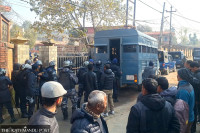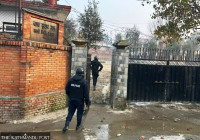Valley
When nature calls, where do you go in Kathmandu?
The city utterly lacks public toilets, and if there are some, they are disgusting and they stink..jpg&w=900&height=601)
Anup Ojha
Chetana Tamang is a bachelor level student at Ratna Rajya Campus. What troubles her every time she is at the college is finding a place when nature calls.
“The condition of the toilets here at the college is so pathetic that I have to find a restaurant nearby to relieve myself,” said the 21-year-old college girl. “At times, I just skip class.”
Tamang said while college lavatories are unusable, she cannot even think of public toilets in Kathmandu.
“And I wonder why our elected representatives keep on talking about smart toilets when they have not been able to fix the existing toilets,” Tamang told the Post.
Even though Nepal has been declared a fully open defecation free country earlier in September this year, people continue to relieve themselves outdoors. And many say the situation in the federal capital, Kathmandu, is worse.
On Tuesday, when the world observes World Toilet Day, various agencies in Nepal also will organise programmes to mark the day.
“But what’s the point of celebrating the day when there are no toilets around,” said Tamang.
According to a survey, there are 11 public toilets in Lalitpur Metropolitan City, 10 in Kirtipur Municipality, and six in Madhyapur Thimi Municipality. But none of them meets the proper sanitation measures.
.jpg)
But with no better option around, people are forced to use these filthy toilets.
Ananda Bahadur Ghale from Gorkha has come to Kathmandu for his son’s passport.
“I paid five rupees for urinating,” Ghale, who was spotted outside a public toilet in Ratnapark, told the Post. “But the facility is disgusting. I could hardly breathe.”
After being elected to office, Kathmandu Mayor Bidya Sundar Shakya had promised to construct public toilets in different locations in his first 100 days. But two years since entering the office, the largest metropolitan city has not been able to install even one of the most essential facilities in the city.
According to the survey, there are 38 public toilets in the Kathmandu Metropolitan City, but only a dozen of them are in operation and all of them are in poor condition.
When asked, Ishwor Man Dangol, spokesperson for the Kathmandu Metropolitan City, said he didn't know how many public toilets are in operation in the city.
He, however, admitted that the metropolitan city has not been able to deliver on its one of the first promises of building new toilets and fixing the old ones.
“We are working to establish 15 restrooms in Swayambhu, Bouddha, Hanumandhoka and New Bus Park, among other areas,” said Dangol.
However, this is not the first time, the metropolitan city has promised to build public toilets.
Last year, the metropolitan city had announced that it had identified 41 locations to construct public toilets.
“Clean toilets are the basic need of every individual. But the government authorities have failed to internalise this basic need,” said Kishore Thapa, an urban planner and former government secretary. “Government must ensure that there are lavatories at educational institutions, public spaces and government offices.”




 20.12°C Kathmandu
20.12°C Kathmandu.jpg)












